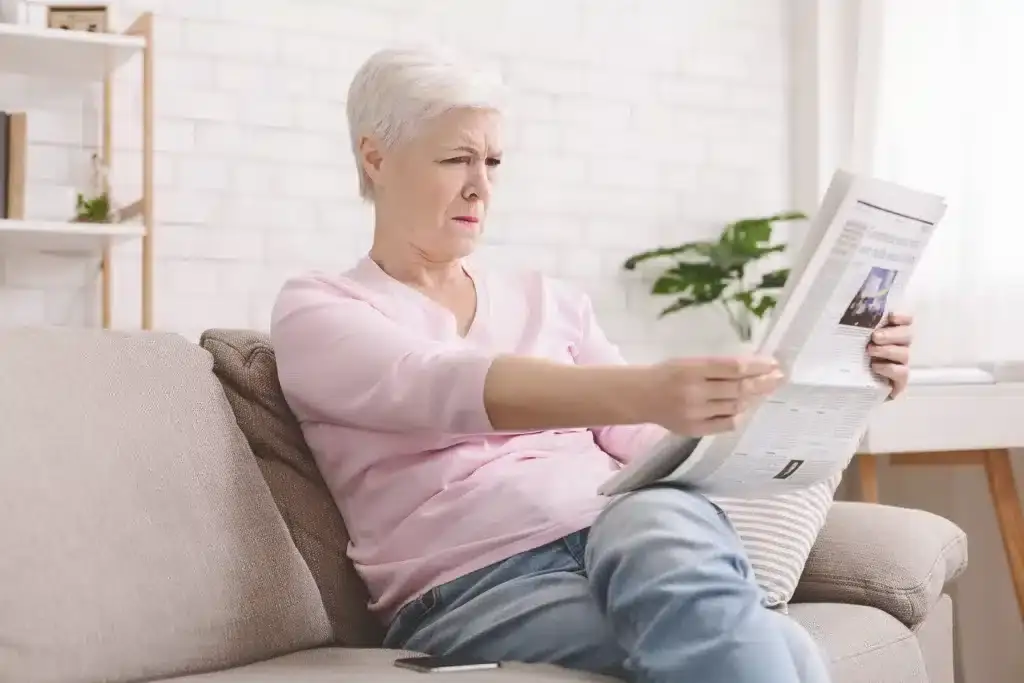As a kid, you might have been confused the first time you saw an older person hold a menu farther away from their eyes in order to see it clearly. After all, isn’t it easier to see things that are closer up? Typically, yes, but as people grow older, their eyes gradually lose the ability to see nearby objects. This is a normal part of aging that often begins to pop up in middle age. If you’re over the age of 40, keep an eye out for presbyopia symptoms if you haven’t noticed them already.
Causes of Presbyopia
The lens of the eye changes shape to focus light onto the retina, allowing you to see clearly. Young people typically have soft, flexible lenses, which let them focus on far-away objects as well as close-up objects. But around age 40, the lens becomes more rigid. This is known as presbyopia. Because a rigid lens does not easily change shape, it’s hard to see close-up objects clearly.
Presbyopia is a normal part of the aging process that cannot be prevented or reversed. However, it can be treated using eyeglasses or contacts. We can also treat presbyopia with Vuity eye drops, the first prescription eye drops to treat age-related farsightedness. If you have presbyopia, talk to your eye doctor about this treatment option during your next eye exam.
Signs You May Have Presbyopia
Are you beginning to experience presbyopia? Keep an eye out for these presbyopia symptoms:
- Difficulty seeing things up close
- Discovering that holding reading materials farther away from your eyes helps you focus on them
- Eye strain
- Sore, tired eyes
- Headaches
Although these symptoms will likely worsen over time, they tend to pause around age 65.
Presbyopia vs. Farsightedness
Keep in mind that presbyopia is not the same thing as farsightedness (also known as hyperopia), which is another refractive error that makes it difficult to see things up close. Although they have similar symptoms, farsightedness is caused by the natural shape of the eyeball and is a lifelong condition that can affect people of all ages. It’s possible to have both hyperopia and presbyopia; in fact, farsighted people tend to notice presbyopia symptoms sooner because they already struggle to see things up close.
Origin of the Word Presbyopia
If you ever forget what presbyopia means, turn to the ancient Greeks! The word presbyopia originates from two Greek terms: presbys, which means “old man” and also “elderly, aged,” and the suffix -opia, which comes from the Greek word for “eye.” Just from that, you can understand that presbyopia is a condition affecting elderly eyes.
_____
Have you been experiencing some presbyopia symptoms?
If presbyopia is your only vision concern, you may just need a pair of inexpensive reading glasses! Schedule an eye exam so that you know the specific power of reading glasses you need. Once you have your glasses, keep them handy so that you can wear them whenever you’re reading, looking at a menu, texting, and more. You might also be interested in Vuity eye drops, an innovative eye drop that can help certain individuals with presbyopia.
If you also suffer from nearsightedness, farsightedness, astigmatism, or another vision issue, your eye doctor can help you locate the best treatment for your exact situation. You may need to consider bifocals, trifocals, or progressive lenses.
If you need quality eye care, stop by Heffington’s if you live in southwest Missouri. Since 1975, the Heffington family has been assisting the Springfield community with top-quality eye care and affordable eyeglasses and contacts. One of the unique features of our family-owned business is that we manufacture lenses at our own laboratory, giving us total control over the service and pricing, and we’re happy to pass our savings on to you. To learn more about our products and services, please get in touch with us online, send an e-mail to asktheexperts@heffingtons.com, or give us a call at 417-869-3937 (Optiland location) or 417-882-3937 (House of Vision location). We look forward to hearing from you!

